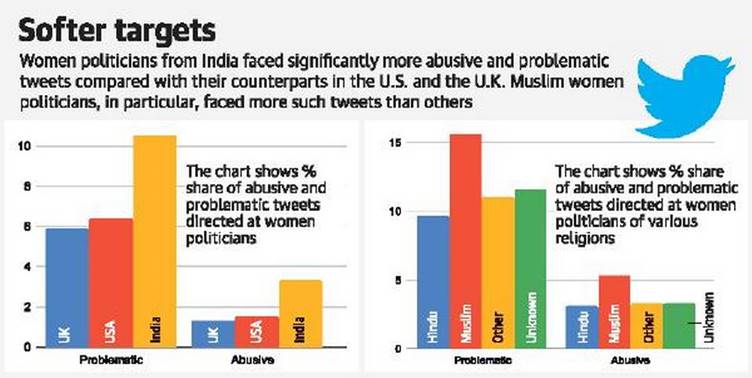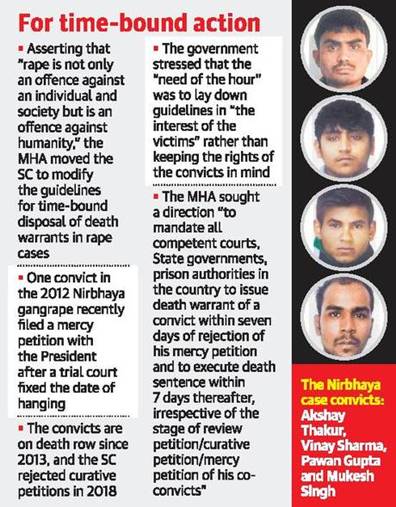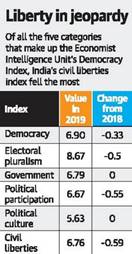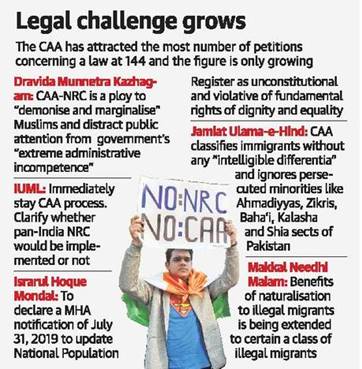



Women politicians trolled more: Amnesty India
A “young woman” named Vyom Mitra will ride to space in the first test flight of the human space mission, Gaganyaan.
- She is half-humanoid.
- She can do switch panel operations, ECLSS [environment control and life support systems] functions, be a companion, converse with the astronauts, recognise them and also respond to their queries.
- Humanoid will simulate the human functions required for space before real astronauts take off before August 2022.
- Two trial flights without crew will take place with a humanoid — the first around December 2020 and the second around July 2021.
- Objective is to check how she responds to living outside earth in controlled zero-gravity conditions.
- She can detect environmental changes within the cabin and change the air condition.
- Gaganyaan is an Indian crewed orbital spacecraft intended to be the formative spacecraft of the Indian Human Spaceflight Programme.
- The spacecraft is being designed to carry three people, and a planned upgraded version will be equipped with rendezvous and docking capability.
- In its maiden crewed mission, Indian Space Research Organisation's largely autonomous 3.7-tonne (8,200 lb) capsule will orbit the Earth at 400 km (250 mi) altitude for up to seven days with a two or three-person crew on board.
- The crewed vehicle is planned to be launched on ISRO's GSLV Mk III in December 2021.
- Screening of the airport passengers for novel Coronavirus (nCoV) illness.
- All the States have been alerted.
- Passengers travelling from that country were being requested to report to the nearest public health facility in case they felt any symptoms.
- Government is identify gaps and strengthen core capacities needed to prepare for, detect and respond to possible outbreaks.
- Integrated Disease Surveillance Programme has been issued advisory to all States/UTs to pick up any travel related case reported in the community and follow-up contacts of suspect/confirmed cases.
- A travel advisory had been issued and posted on the Health Ministry’s website.
- The National Institute of Virology, Pune, is fully geared to test samples of nCoV.
- Adequate stock of Personal Protection Equipment is being maintained by Medical Stores Organisation.
- It appears to be only the second time the novel coronavirus has been detected outside China.
- It is from the same family as the pathogen that causes SARS (Severe Acute Respiratory Syndrome), which killed 349 people in mainland China and 299 in Hong Kong in 2002 and 2003.
- Not clear whether the mystery virus can be transmitted between humans.

- One out of every seven tweets mentioning them is problematic or abusive, with many women targeted by a relentless flow of threats and sexist, religious, racist and casteist slurs.
- While all women are targeted, Muslim women politicians faced 55% more abuse than others.
- Many women do not enter politics because the price of constant online harassment and trolling was too high.
- Rape threats are routine, as are character assassinations, insinuations about sexual relationships with older men.
- Women from marginalised castes, unmarried women, and those from non-BJP parties faced a disproportionate share of abuse.
Cabinet approved a six-month extension in the tenure of the commission to examine sub-categorisation of Other Backward Classes (OBC).
- Approved an addition to the commission’s terms of reference.
- Study the various entries in the Central list of OBCs and recommend correction of any repetitions, ambiguities, inconsistencies and errors of spelling or transcription.
- It will look into the existing list of OBCs and categorise the castes that have not benefited from reservation in government jobs and education.
- It is also expected to give its recommendations to ensure that these marginalised communities get the benefits of various schemes.
- The commission is headed by the G. Rohini, former Chief Justice of the Delhi High Court.
- While the term ‘OBC’ is not mentioned in the Constitution, Article 15 allows the State to make special provisions for the advancement of any socially and educationally backward classes (SEBC) of citizens.
- Article 340 allows the President of India to appoint a commission to investigate into the issues related to OBC.
- National commission on backward communities have already been given the constitutional status.
- Certain communities from OBC sections have received more benefits compared to the other communities.
- Perpetuity of reservation: where certain community keeps on reaping the benefits thus increasing the inequality within the OBC section. It would ensure that reservation benefits are passed on to deprived caste only.
- Though Indra Shahney judgement of the Supreme Court had brought concept of creamy layer to exclude affluent class from ambit of the reservation, but there is not provision to exclude the whole caste even if it has come out of the social and economic backwardness.
- This commission will provide the parameters for assessing the social and economic backwardness which will be helpful in evaluating the performance of reservation policy.
- Populist policies pursued by the different states have increased the number of OBC caste thus necessitating an activity to filter out the developed caste.
- Since Indra Shahney judgement capped the limit for reservation at 49%, achieving the objective of social justice requires dynamism in the categorisation of caste.
- Nine States of the country viz., Andhra Pradesh, Telangana, Puducherry, Karnataka, Haryana, Jharkhand, West Bengal, Bihar, Maharashtra and Tamil Nadu have already carried out sub-categorization of Other Backward Classes. Hence, there is a need for sub-categorisation at national level too.
- Approved an agreement on bilateral legal and criminal cooperation to be sealed during the coming visit of President Jair Bolsonaro of Brazil.
- The agreement aims to enhance effectiveness of both the countries in investigation and prosecution of crime through cooperation and mutual legal assistance in criminal matters.
- Approved three pacts, covering research in minerals and mining, child behaviour and energy cooperation.
- The MoU in the energy sector will allow for joint exploration in the petroleum and natural gas segment.
The State Election Commission successfully trial tested the facial recognition application for voter verification at polling stations using real time authentication capabilities.
- Testing of the application was necessitated in view of the persistence of cases of impersonation in the voting process.
- Earlier, there was violation in voting procedure leading to conduct of re-poll in these areas.
- The National Child Award for Exceptional Achievement was instituted in 1996 to give recognition to children with exceptional abilities and outstanding achievements in the fields of innovation, scholastic achievements, social service, arts & culture and sports.
- The award carries a medal, a cash prize of Rs. 1 lakh, a certificate and a citation.
- From the year 2018, the award has been renamed as the Bal Shakti Puraskar and achievements of children in the field of bravery are also acknowledged.
- It is chosen by Ministry of women and child development.

- Asked the Supreme Court to frame guidelines to execute death penalty of condemned prisoners within seven days of rejection of their mercy petitions.
- The MHA filed an application in the court to seek “appropriate clarification/modification and directions” in the 2014 Shatrughan Singh Chauhan and another vs Union of India judgment that defined the procedure to be adopted in cases of prisoners on death row.
- The guideline are “accused-centric”.
- They do not take into account an irreparable mental trauma, agony, upheaval and derangement of the victims and their family members.
- They harm the collective conscience of the nation and the deterrent effect which the capital punishment intends to make.
- Convicts of heinous crimes under the garb of Article 21 take the judicial process for a rid.
- Under the criminal justice system, a fool proof regime is being provided to accused at various stages of judicial scrutiny to ensure that an accused is punished strictly in accordance with law and convicts be not allowed to misuse the judicial processes.
- A time period be fixed for death row convicts to file curative pleas after the rejection of their review pleas.
- If a death row convict wanted to file a mercy petition, it should be made mandatory for him to “do so only within a period of seven days from the date of receipt of death warrant issued by the competent court”.
- Delay in carrying out the death sentence was, indeed, one ground for commutation.
- The Court, however, refused to provide a specific time after which a delay would render commutation necessary, and held that each case would be adjudicated on its own merits.
- Keeping a death row convict under the shadow of death for years is a form of cruel, inhuman and degrading punishment that no civilized society (whether or not it allows capital punishment) should inflict upon human beings.
- The inevitable mental agony that accompanies waiting for an inevitable death, demeans individual dignity.
- Insanity was a ground for commutation.
- Issued guidelines:
- written communication of the outcome of a mercy petition to a convict and his family,
- the provision of free legal aid,
- A post-mortem report to verify whether hanging, as a form of capital punishment, caused undue amounts of pain.
The world’s biggest democracy slipped 10 places in the 2019 global ranking to 51st place.
- Primary cause of “the democratic regression” is “an erosion of civil liberties in the country”.
- India’s overall score fell from 7.23 to 6.9, on a scale of 0-10, within a year (2018-2019) — the country’s lowest since 2006.
- The report talks about the repeal of both Article 370 and Article 35A and how ahead of the move, “the government deployed a large number of troops in J&K, imposed various other security measures and placed local leaders under house arrest, including those with pro-India credentials.”
- The government also restricted Internet access in the State.
- NRC exercise in Assam excluded 1.9 million people from the final list, and that “the vast majority of people excluded from the NRC are Muslims.”
- The new citizenship law has enraged the large Muslim population, stoked communal tensions and generated large protests in major cities.
- The Index also categorises India under “flawed democracies”.
- Countries that hold free and fair elections and where basic civil liberties are respected.
- have significant weaknesses in aspects of democracy,
- such as problems in governance
- an underdeveloped political culture
- Low levels of political participation.
- The average global score also recorded its worst value ever, down from 5.48 in 2018 to 5.44, driven by a sharp regression in Latin America and Sub-Saharan Africa.
- There are only 22 “full democracies” as compared to 54 “authoritarian regimes”.
- It was done by The Economist Intelligence Unit — the research and analysis division of The Economist Group.
- India was graded in electoral process and pluralism (8.67), government functioning (6.79), political participation (6.67), political culture (5.63) and civil liberties (6.76).

Reference: https://www.thehindu.com/todays-paper/india-drops-10-ranks-in-democracy-index/article30629988.ece

- Refused to stay the law without hearing the government first.
- Court heed pleas to even postpone the process of collecting population data to identify illegal migrants or “doubtful citizens” on the basis of their religion.
- Indicated that the CAA challenge may eventually be referred to a Constitution Bench for a decision on merits.
- It gave the government four weeks to file its response.
- Court said that any law like the CAA is reversible.
- The most immediate concern now is the sweeping powers given to executive authorities to brand people as ‘doubtful citizens’.
- Once this is done, there are no guidelines to help these people.
- It will lead to gerrymandering of electoral rolls.
- The concern is spread across both the majority Hindus and the minorities as well.
- The process of granting citizenship under CAA is already under way.
- Urged the court to postpone the NPR and the citizenship process for at least two months to avoid chaos.
- Final certificate of citizenship by naturalisation to illegal migrants should be stayed during the pendency of the case.
- Indian citizenship once granted cannot be revoked if the challenge to the CAA succeeded in court.

© 2025 iasgyan. All right reserved